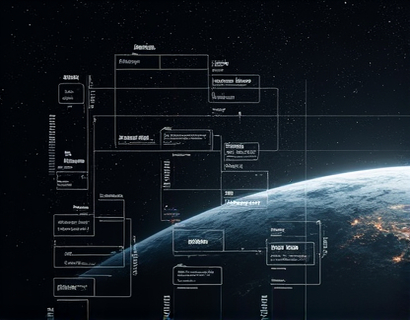Unlocking Market Success in Modern Ecosystems: Navigating Economic Prosperity and Opportunities
The landscape of modern economies has evolved significantly, transforming traditional markets into complex ecosystems where various stakeholders interact in intricate ways. This shift presents both challenges and opportunities for economists, business leaders, investors, and industry experts. Understanding the economic dynamics of these modern ecosystems is crucial for staying competitive and informed. This guide aims to provide strategic insights and detailed analysis to help professionals identify and capitalize on emerging market opportunities.
Modern ecosystems are characterized by interconnected networks of businesses, consumers, technologies, and regulatory frameworks. These ecosystems are dynamic, constantly adapting to technological advancements, changing consumer behaviors, and global economic trends. For instance, the rise of digital platforms has created new market structures where companies like Amazon and Google dominate through network effects and data-driven strategies. These platforms not only sell products but also influence the entire supply chain, from producers to end-users.
Understanding the Core Components of Modern Ecosystems
To navigate these ecosystems effectively, it is essential to understand their core components. At the heart of any ecosystem are the key players: producers, consumers, and intermediaries. Producers create value through goods and services, while consumers demand and shape market preferences. Intermediaries, such as distributors and platforms, facilitate transactions and enhance market efficiency.
Another critical component is technology, which acts as the backbone of modern ecosystems. Technological innovations drive efficiency, create new business models, and enable data-driven decision-making. For example, blockchain technology is revolutionizing supply chain management by providing transparency and reducing fraud. Artificial intelligence and machine learning are transforming industries by automating processes and offering personalized experiences to consumers.
Economic Dynamics in Modern Ecosystems
The economic dynamics within modern ecosystems are multifaceted. One key aspect is the concept of network effects, where the value of a product or service increases as more people use it. This phenomenon is evident in social media platforms and marketplaces, where user growth fuels further adoption and value creation. Network effects can lead to winner-take-all scenarios, where a single player dominates the market, making it challenging for new entrants to compete.
Another important dynamic is the role of data. In today's digital economy, data is a valuable resource that can be leveraged for insights, personalization, and competitive advantage. Companies that effectively collect, analyze, and utilize data can optimize operations, enhance customer experiences, and develop targeted marketing strategies. However, the data economy also raises significant privacy and ethical concerns that need to be addressed.
Opportunities for Growth and Innovation
Within these complex ecosystems, numerous opportunities for growth and innovation emerge. For businesses, entering a new ecosystem can open doors to untapped markets and customer segments. For instance, the rise of e-commerce has allowed traditional retailers to expand their reach beyond physical stores, reaching a global audience. Similarly, startups can leverage emerging technologies to disrupt established industries and create new value propositions.
Collaboration and partnerships are also vital in modern ecosystems. By forming alliances with other players, companies can pool resources, share risks, and access complementary expertise. For example, tech companies often partner with financial institutions to offer innovative payment solutions, combining technological prowess with financial expertise. Such collaborations can lead to synergies that enhance market competitiveness and drive innovation.
Navigating Challenges and Risks
While the opportunities in modern ecosystems are compelling, they come with significant challenges and risks. One major challenge is the rapid pace of change, which can make it difficult for businesses to keep up. Continuous learning and adaptability are essential to remain relevant. Additionally, the increased competition in these ecosystems can lead to intense rivalry, making it crucial to differentiate through unique value propositions and customer experiences.
Regulatory environments also pose challenges, as governments around the world seek to address the unique issues posed by modern ecosystems. Compliance with data protection laws, antitrust regulations, and industry-specific standards is critical. Companies must stay informed about regulatory developments and proactively manage compliance to avoid legal and reputational risks.
Strategies for Success in Modern Ecosystems
To thrive in modern ecosystems, businesses and professionals should adopt several key strategies. First, embracing a customer-centric approach is paramount. Understanding customer needs and preferences through data analytics and feedback can inform product development and marketing strategies. Personalization and seamless user experiences are increasingly important in retaining and acquiring customers.
Second, investing in technology and innovation is essential. Companies should allocate resources to research and development to stay at the forefront of technological advancements. Adopting agile methodologies can help organizations be more responsive to market changes and customer demands. Furthermore, fostering a culture of innovation within the organization can drive continuous improvement and creativity.
Third, building strategic partnerships can provide a competitive edge. By collaborating with other players in the ecosystem, businesses can access new markets, technologies, and expertise. Open innovation models, where companies share intellectual property and collaborate on projects, can lead to breakthrough solutions and shared value.
Case Studies of Market Success
Examining successful case studies can provide valuable insights into navigating modern ecosystems. Take the example of Netflix, which transformed from a DVD rental service to a leading streaming platform. Netflix leveraged data analytics to understand viewer preferences, invested in original content to differentiate itself, and adopted a global expansion strategy. These moves allowed Netflix to capture a significant share of the entertainment market and adapt to changing consumer behaviors.
Another notable example is Airbnb, which disrupted the traditional hospitality industry by creating a peer-to-peer accommodation platform. Airbnb utilized social proof and community building to gain trust and scale rapidly. By focusing on user experience and leveraging technology to simplify the booking process, Airbnb has become a household name and a significant player in the travel industry.
Future Trends and Predictions
Looking ahead, several trends are likely to shape the future of modern ecosystems. The continued growth of digital technologies, such as 5G, IoT, and quantum computing, will further enhance connectivity and data capabilities. These advancements will enable more sophisticated applications and services, opening new markets and opportunities.
Sustainability and social responsibility are also becoming increasingly important. Consumers and investors are demanding more ethical and sustainable practices from businesses. Companies that integrate sustainability into their core strategies and operations are likely to gain a competitive advantage and build long-term loyalty.
Lastly, the rise of decentralized technologies, such as blockchain and decentralized finance (DeFi), is reshaping economic models by promoting transparency, security, and inclusivity. These technologies have the potential to create new market structures and business models that challenge traditional paradigms.
In conclusion, navigating modern ecosystems requires a deep understanding of their economic dynamics, strategic adaptability, and a focus on innovation and collaboration. By embracing these principles and staying informed about emerging trends, professionals can identify and capitalize on market opportunities, ensuring economic prosperity and success in the dynamic economic landscape.










































